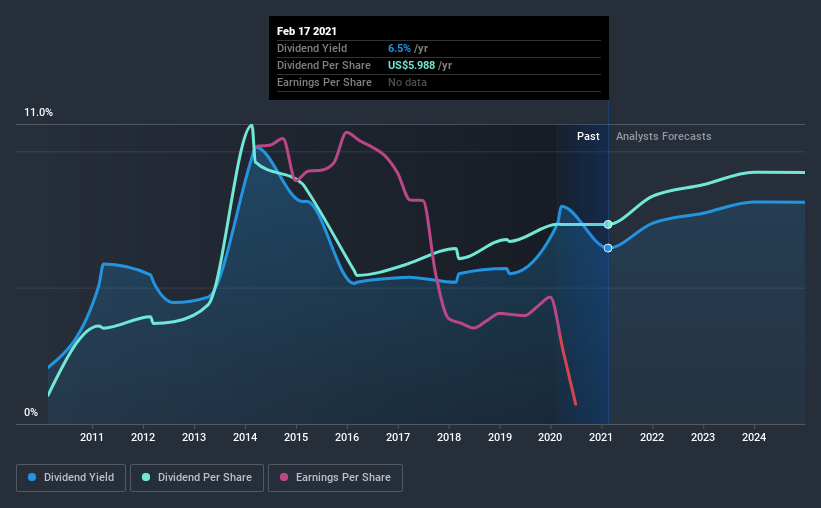- Switzerland
- /
- Insurance
- /
- SWX:SREN
Are Dividend Investors Getting More Than They Bargained For With Swiss Re AG's (VTX:SREN) Dividend?
Is Swiss Re AG (VTX:SREN) a good dividend stock? How can we tell? Dividend paying companies with growing earnings can be highly rewarding in the long term. If you are hoping to live on the income from dividends, it's important to be a lot more stringent with your investments than the average punter.
With Swiss Re yielding 6.5% and having paid a dividend for over 10 years, many investors likely find the company quite interesting. We'd guess that plenty of investors have purchased it for the income. The company also returned around 2.7% of its market capitalisation to shareholders in the form of stock buybacks over the past year. When buying stocks for their dividends, you should always run through the checks below, to see if the dividend looks sustainable.
Explore this interactive chart for our latest analysis on Swiss Re!

Payout ratios
Dividends are usually paid out of company earnings. If a company is paying more than it earns, then the dividend might become unsustainable - hardly an ideal situation. So we need to form a view on if a company's dividend is sustainable, relative to its net profit after tax. Although Swiss Re pays a dividend, it was loss-making during the past year. When a financial business is loss-making and pays a dividend, the dividend is not covered by profits. Its important that investors assess the quality of the company's assets and whether it can return to generating a positive income.
Consider getting our latest analysis on Swiss Re's financial position here.
Dividend Volatility
Before buying a stock for its income, we want to see if the dividends have been stable in the past, and if the company has a track record of maintaining its dividend. Swiss Re has been paying dividends for a long time, but for the purpose of this analysis, we only examine the past 10 years of payments. Its dividend payments have declined on at least one occasion over the past 10 years. During the past 10-year period, the first annual payment was US$0.9 in 2011, compared to US$6.0 last year. Dividends per share have grown at approximately 21% per year over this time. The dividends haven't grown at precisely 21% every year, but this is a useful way to average out the historical rate of growth.
It's not great to see that the payment has been cut in the past. We're generally more wary of companies that have cut their dividend before, as they tend to perform worse in an economic downturn.
Dividend Growth Potential
Given that the dividend has been cut in the past, we need to check if earnings are growing and if that might lead to stronger dividends in the future. Swiss Re's EPS have fallen by approximately 57% per year during the past five years. With this kind of significant decline, we always wonder what has changed in the business. Dividends are about stability, and Swiss Re's earnings per share, which support the dividend, have been anything but stable.
Conclusion
When we look at a dividend stock, we need to form a judgement on whether the dividend will grow, if the company is able to maintain it in a wide range of economic circumstances, and if the dividend payout is sustainable. Swiss Re is paying out a dividend despite reporting a loss; clearly a concern. Second, earnings per share have been in decline, and its dividend has been cut at least once in the past. With any dividend stock, we look for a sustainable payout ratio, steady dividends, and growing earnings. Swiss Re has a few too many issues for us to get interested.
It's important to note that companies having a consistent dividend policy will generate greater investor confidence than those having an erratic one. Still, investors need to consider a host of other factors, apart from dividend payments, when analysing a company. As an example, we've identified 2 warning signs for Swiss Re that you should be aware of before investing.
If you are a dividend investor, you might also want to look at our curated list of dividend stocks yielding above 3%.
When trading Swiss Re or any other investment, use the platform considered by many to be the Professional's Gateway to the Worlds Market, Interactive Brokers. You get the lowest-cost* trading on stocks, options, futures, forex, bonds and funds worldwide from a single integrated account. Promoted
New: Manage All Your Stock Portfolios in One Place
We've created the ultimate portfolio companion for stock investors, and it's free.
• Connect an unlimited number of Portfolios and see your total in one currency
• Be alerted to new Warning Signs or Risks via email or mobile
• Track the Fair Value of your stocks
This article by Simply Wall St is general in nature. It does not constitute a recommendation to buy or sell any stock, and does not take account of your objectives, or your financial situation. We aim to bring you long-term focused analysis driven by fundamental data. Note that our analysis may not factor in the latest price-sensitive company announcements or qualitative material. Simply Wall St has no position in any stocks mentioned.
*Interactive Brokers Rated Lowest Cost Broker by StockBrokers.com Annual Online Review 2020
Have feedback on this article? Concerned about the content? Get in touch with us directly. Alternatively, email editorial-team (at) simplywallst.com.
About SWX:SREN
Swiss Re
Provides reinsurance, insurance, other insurance-based forms of risk transfer, and other insurance-related services worldwide.
Excellent balance sheet established dividend payer.
Similar Companies
Market Insights
Community Narratives



